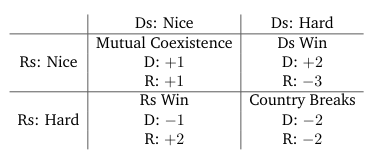I just don't think there's any reason for the Dems not to nuke the filibuster. D success over the next four years will be contingent on the filibuster not existing. Most notably, this includes potential anti-hardball reforms that make R retaliation more difficult.
The Republican party is a minority party. They have only two real options:
1) rely on minoritarian aspects of our constitutional system to cement their hold on politics, or
2) start supporting policies Americans actually like.
The Democrats can and must force them to do 2.
1) rely on minoritarian aspects of our constitutional system to cement their hold on politics, or
2) start supporting policies Americans actually like.
The Democrats can and must force them to do 2.
Indeed if they don't, there is the very real risk that Republicans will simply escalate anyway as soon as they have power again. Runaway escalation by a minority party is bad.
Democrats can weaponize the threat of escalation to achieve majoritarian reforms that, as a side effect (because they are the majority party), will benefit them: districting reform, SCOTUS depoliticization, voting rights guarantees, whatever. But the threat must be real!
Nuking the filibuster is an unattractive idea to conservative Dems. Understandably so. But nuking the filibuster _because otherwise it will basically be impossible to meaningfully de-escalate_ is an easier sell.
The game is asymmetric. Ds think it's a hawk-dove game. They're fine playing dove to Rs' hawk because escalation is seen as worse. But to Rs, it's a prisoner's dilemma. They will defect no matter what. To them, "break the country" is a better option than "lose"!
Sample asymmetric payoff matrix. Ds see this as a hawk-dove game: they might play nice. Rs see this as a PD: status quo, they will always play hard.
The status quo must be disrupted.
The status quo must be disrupted.
Throwback to when this seemed relevant  https://twitter.com/koaleszenz/status/1321095446782234625
https://twitter.com/koaleszenz/status/1321095446782234625
 https://twitter.com/koaleszenz/status/1321095446782234625
https://twitter.com/koaleszenz/status/1321095446782234625
If the Democrats threatened to play hard, e.g., by packing the court UNLESS Rs worked with them to pass a constitutional amendment that abolishes lifetime tenure, well! That would give Rs a way to play nice without ruining their own position
This is another idea. Everyone wins. The Rs don't look weak, the Ds don't have to reckon as much with an entrenched minority party, and the country doesn't collectively have a panic attack every time a SCOTUS justice dies. https://twitter.com/koaleszenz/status/1321192952887128065
The ball is in the Ds' court.
Another way to look at the game is to consider that the Ds are wrong about the game being hawk-dove. If Rs keep winning despite supporting shitty policies, there may not be a country left soon.
Threat of defection can incentivize cooperation.
Another way to look at the game is to consider that the Ds are wrong about the game being hawk-dove. If Rs keep winning despite supporting shitty policies, there may not be a country left soon.
Threat of defection can incentivize cooperation.
With every passing election and every erosion of norms, the cost to mutual defection increases. Likewise the cost to R defection.
Hence the importance of playing hardball as ANTI-hardball.
(thread loosely inspired by this article https://scholarship.law.columbia.edu/faculty_scholarship/2575/)
Hence the importance of playing hardball as ANTI-hardball.
(thread loosely inspired by this article https://scholarship.law.columbia.edu/faculty_scholarship/2575/)
See also this article on game theory and political escalation by @Matt_Seligman: https://papers.ssrn.com/sol3/papers.cfm?abstract_id=3210665

 Read on Twitter
Read on Twitter


